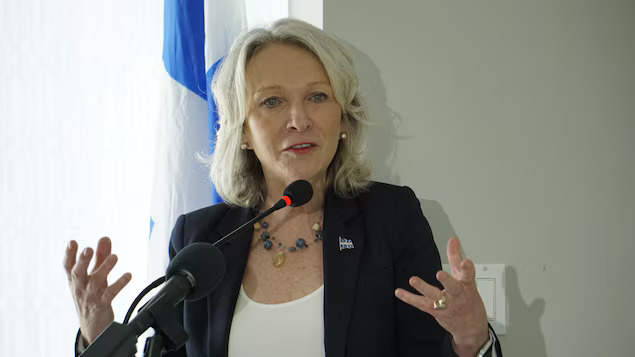Canada News
Quebec moves ahead with allowing advanced requests for assisted dying
By Benjamin Shingler, CBC News, RCI

Sonia Bélanger, Quebec’s minister responsible for seniors, says the province won’t wait for Ottawa in making changes to medical assistance in dying. Photo: Radio-Canada / Jean-François Deschênes
Federal government urges province to wait for them to make countrywide changes
Quebec is going ahead with its plan to authorize early requests for medical assistance in dying, despite concerns raised by the federal government.
Starting Oct. 30, the province will begin accepting requests for assisted dying, known as MAID, before a person’s condition, such as Alzheimer’s, renders them incapable of giving consent.
Health officials held a briefing for journalists early Thursday to outline how applications will be considered, and pointed to new online guidelines for patients and physicians (new window).
Dr. Stéphane Bergeron, an assistant deputy health minister, said during the briefing that patients who could potentially be eligible will need to meet with doctors on multiple occasions to understand how it would work and when it would apply.
It’s something that will take a bit of time before this goes ahead,
Bergeron said.
Ottawa says to ‘wait’
The federal government has repeatedly expressed concern about Quebec moving forward with advanced consent before it modifies the Criminal Code.
Federal Health Minister Mark Holland told La Presse (new window) on Wednesday that Quebec should wait
before going ahead.
In a follow-up statement to CBC News on Thursday, his office said the federal government is taking the necessary time to examine the details of what the government of Quebec has announced.
We are committed to working with Quebec — and all provinces and territories — to carefully consider next steps,
the statement said.
On Thursday, Sonia Bélanger, the minister responsible for seniors, said the province had conducted a rigorous
assessment of how the new rules will be applied, and will move ahead without Ottawa.
In the case of MAID, we have never waited for the federal government,
she told reporters in Quebec City.
For more than a year, Quebec has been calling on the federal government (new window) to modify the Criminal Code to allow people to make such requests — and made it clear in August it would not wait any longer.
The provincial government adopted a law in June 2023 permitting people with serious and incurable illnesses, such as Alzheimer’s disease, to ask for assisted dying while they have the capacity to provide consent, with the procedure being carried out after their condition has worsened.
The province has asked the Director of Criminal and Penal Prosecutions to respect the conditions laid out in the act respecting end-of-life care when it comes to pressing criminal charges.
A question of dignity
Georges L’Espérance, a retired neurosurgeon and head of the Quebec Association for the Right to Die with Dignity, doesn’t believe there’s a need to wait any longer.
We have a lot of reports on that, and we have a lot of expertise on that,
he said.
L’Espérance said said it will be up to patients and their families to determine at what stage they no longer want to live, and that could vary from person to person. For example, a person with Alzheimer’s may decide they want MAID when they no longer recognize their family or can’t feed themselves, he said.
If you have that law, you know that you won’t go in the last year of the disease, in the path when you lose all your dignity,
he said.
Some health professionals remain opposed to the changes. Dr. Catherine Ferrier, an assistant professor in McGill University’s department of family medicine and a member of the group Living with Dignity (new window), has worked with patients with dementia for 40 years.
She said it will be difficult for a patient to know if they will want to die five years from now, or longer.
There are many, many unknowns there,
she said. You don’t know if you will be suffering.
Ferrier said the province should instead be focused on providing better care to patients with dementia.
You’re never undignified. You have the dignity of a person for your whole life,
she said.
I find it sad that in Quebec we’re not providing all the supports that people need as they get older and more vulnerable and people lose their cognition, and then we’re fast-tracking death.
with files from Kwabena Oduro, Cathy Senay and The Canadian Press
This article is republished from RCI.





















